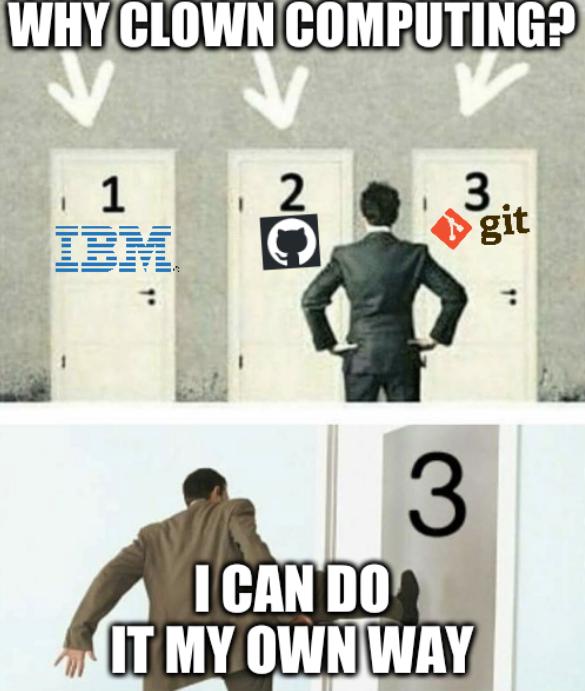

"The term/name "Git" isn't necessarily helpful either, e.g. when people think of it as synonymous with Microsoft/GitHub."WELL OVER a decade ago we stressed that for true software freedom we need to do better than just swapping "masters" (like Apple and Microsoft or IBM and Microsoft). Back then the word "masters" wasn't -- at least not yet -- considered politically-charged and it served as a helpful metaphor. Choosing IBM and IBM software (typically proprietary back then, e.g. Lotus) over Microsoft's wasn't really the solution, it was more of a "lesser evil" choice (like choosing Biden over Trump).
So-called 'clown computing' is a new wave of proprietary software (or service as a substitute for actual software). The FSF is a bit late in addressing this threat, but better late than never, correct? People ought to talk about the topological issues (relationship between the user and governments/corporations). That applies to trust models as well. People are giving far too much control to self-serving psychopaths and then wonder why projects like YouTube-DL (which do nothing illegal) can be censored across mirrors/forks/branches as well. Why all the centralisation in the first place? Why GitHub?
Remember that in 'clown computing' the users are clowns and all the computing is controlled by Gods or "masters". Is that true love? Those "masters" love power -- or control over other people. Microsoft loves "Open Source" when it is hosted in GitHub, i.e. stuck inside Microsoft's monopolistic and proprietary prison. At whose mercy is it?
 Two decades ago I advocated/promoted very heavily this thing called "LINUX", only later to realise the considerable role GNU had played. A lot of things that people call "LINUX" are actually GNU (many GNU programs are wrongly being called "Linux commands"). Brands aren't necessarily helpful when people over-obsess over mere brands, emphasising pedantic points that misdirect and obfuscate. The term/name "Git" isn't necessarily helpful either, e.g. when people think of it as synonymous with Microsoft/GitHub. In order to reduce the likelihood or prevent/mitigate new GNU/Linux users 'ruining' things by demanding DRM, 'Secure Boot' or Chrome (along with other such malicious stuff) more GNU/Linux advocacy ought to focus on educating/informing people regarding Software Freedom (capitalised, but it is a concept, not a brand/trademark). To attain it we need to focus a lot less on brands and more on underlying substance. ⬆
Two decades ago I advocated/promoted very heavily this thing called "LINUX", only later to realise the considerable role GNU had played. A lot of things that people call "LINUX" are actually GNU (many GNU programs are wrongly being called "Linux commands"). Brands aren't necessarily helpful when people over-obsess over mere brands, emphasising pedantic points that misdirect and obfuscate. The term/name "Git" isn't necessarily helpful either, e.g. when people think of it as synonymous with Microsoft/GitHub. In order to reduce the likelihood or prevent/mitigate new GNU/Linux users 'ruining' things by demanding DRM, 'Secure Boot' or Chrome (along with other such malicious stuff) more GNU/Linux advocacy ought to focus on educating/informing people regarding Software Freedom (capitalised, but it is a concept, not a brand/trademark). To attain it we need to focus a lot less on brands and more on underlying substance. ⬆